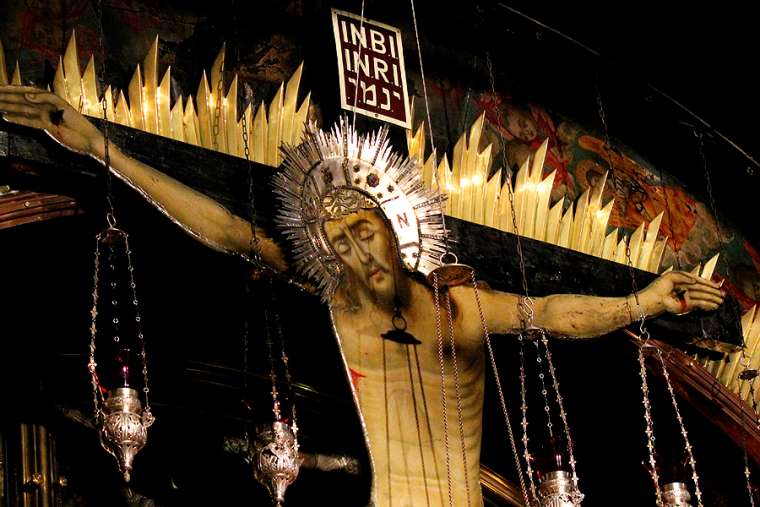Crucifix inside the Church of the Holy Sepulchre in Jerusalem. Credit: Lauren Cater/CNA.
The Lenten Holy Land collection will be moved to September this year because of the suspension of public Masses in many places in the world due to the coronavirus, the Vatican stated yesterday.
The collection is usually taken up in churches during Good Friday services. Good Friday falls this year on 10th April.
According to a press release from the Congregation for Eastern Churches 2nd April, for the year 2020, Pope Francis approved moving the collection to Sunday 13th September, since many countries will not be holding public Good Friday services this year.
The Holy See has overseen the Church’s annual collection for the Holy Land since 1974, when St. Pope Paul VI established Good Friday as the ordinary day for it to be taken up by parishes and bishops around the world.
The collection goes toward the maintenance and upkeep of the holy sites as well as supporting the lives of Christians in the Holy Land.
“Christian communities in the Holy Land, also exposed to the risk of contagion and living in contexts that are often already very tested, benefit every year from the generous solidarity of the faithful from all over the world,” yesterday’s release stated.
The Holy Land collection, it continued, helps the Franciscans of the Custody of the Holy Land and other jurisdictions to be “able to continue their evangelical presence, in addition to maintaining schools and the welfare structures open to all citizens for human education, peaceful coexistence, and care above all for the youngest and poorest.”
The date of 13th September 2020 was chosen for the collection because it is near the 14th September feast of the Exaltation of the Cross, the release said. The Exaltation of the Cross commemorates the discovery of the relic of the cross by St. Helen and “the beginning of public worship in Jerusalem with the construction of the Basilica of the Holy Sepulchre.”
This will make the collection “a sign of hope and salvation rediscovered after the Passion,” the statement said, adding that it is a sign of “solidarity with those who continue to live the Gospel of Jesus in the land where ‘it all began.'”
Due to the coronavirus pandemic, the Church of the Holy Sepulchre was closed in late March with no definite timeline for reopening. This is the first time in nearly 700 years the holy site, which houses the tomb of Christ and the site of the crucifixion, has closed for an extended time.
Authorities in Bethlehem, in the West Bank, closed the Church of the Nativity in early March after four cases of COVID-19 were diagnosed in the town. The Church of the Nativity was built over the birthplace of Jesus Christ. All tourists were subsequently banned from entering Bethlehem.

